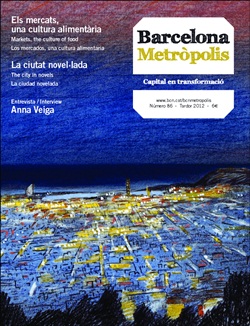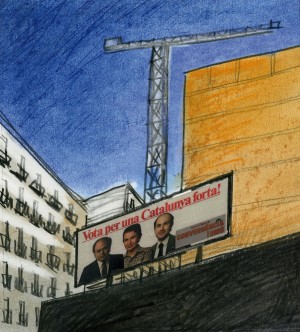Mauricio o las elecciones primarias (‘Mauricio or the Primary Election’) shows a city that doesn’t dare to do what it wishes, a Barcelona that goes from the prescribed dream of the Spanish transition to the promised dream of the Olympic Games, like an ill person who tries his luck with a new stimulant.
Barcelona is the legend of the nameless city, because there is no way you can utter the name of Barcelona twice with it meaning the same thing. Every novel set in Barcelona is about a different city, even in books by the same author. The Barcelonas of Eduardo Mendoza (the novelist who has recreated most visions of Barcelona) in The Truth about the Savolta Case, The City of Marvels, El enredo de la bolsa y la vida [The Tangle of Money and Life] – his most recent one, in a city ravaged by the current recession, where even his famous nameless detective loses his hairdresser’s business – and Mauricio o las elecciones primarias [Mauricio or the Primary Elections] are not the same. Of all the Barcelonas created by Eduardo Mendoza, the latter moved me most; and I do not mean that I was merely impressed, excited or fascinated. I am talking about emotions.
It was published in 2006, when Mendoza had had his readers “fasting” for some time. He had only written two works in the previous ten years, the novel La aventura del tocador de señoras [The Adventure of the Powder Room] (2001) and, also in the summer of 2001, a science fiction serial for El País newspaper, El último trayecto de Horacio Dos [The Last Journey of Horatio Dos], subsequently published in book form. Moreover, both were comedies, hence the herbivorous (or carnivorous) portion of his readership was dying of hunger. In 2006 we saw everything that had been erected by preceding generations come tumbling down. It was the year of the real estate boom, when people started to take to the streets en masse to defend their right to a house. And it is also when Mauricio o las elecciones primarias appeared, a novel set in one of our city’s gloomiest and grimmest epochs, between the elections to the Government of Catalonia in 1984, when the Catalan political map was cast in stone for eternity, and 1986, when Barcelona was awarded the 1992 Olympic Games. It is the Barcelona of the disenchanted left (the novel begins with the socialists out searching for recruits), of real estate speculation subjugating town and city councils, the Barcelona of the outer reaches (part of the action unfolds in Santa Coloma de Gramenet)… This book portrays a grey city, poised to hop from one dream to another, not daring to make its longed-for dream come true, which ranges from the prescribed dream of the political transition to the promise of the Olympic dream, like the patient who changes pills just to try their luck.
The novel is written in a prose shattered by the Basque axe of Baroja. This is Mendoza’s most Baroja-like effort. No writer has ever understood Pío Baroja better than Eduardo Mendoza. Here, as in Baroja, everything is a transcription of a mood: abrupt phrasing, dry, detached dialogues, as if overheard in the house next door, the city itself, its cityscapes and more particularly its characters. Mauricio is a person unable to make choices, who lives in a permanent state of longing, and so, when he is forced to choose between two realities, between two ways of living, he freezes and lets the more powerful reality carry him away, like a flood that sweeps away a dead tree trunk or an entire city.
The most salient topic in all of Mendoza’s books is the struggle for love, the difficult fight to consolidate a love that never seems to fall within reach. Mauricio’s main choices are between a young middle-class lawyer, who still lives with her parents, and a woman from Santa Coloma, a diehard Republican who lives her own life. But both of them also represent these two dreams in which the epoch is submerged. The promise of the success announced in Lausanne, and a dream which, as it did not come true, is now just waiting to die, as all broken dreams do, in sadness and loneliness. Mauricio is the man without a will, caught up in a wave of pessimism, but who will eventually be trapped in a wave of optimism. However, this does not mean that he has been redeemed. Mauricio Greis is also the inverted image of Onofre Bouvila in The City of Marvels (the philologist Cristina Jiménez-Landi Crick has written about the shift from modern to post-modern Barcelona in these novels), so one work is the mirror of the other, as too are their respective Barcelonas. Eduardo Mendoza’s books contain the mirror that Stendhal brought to the novel. All the faces of Barcelona are mirrored in Mendoza’s work. When I read Mauricio o las elecciones primarias, I saw my own Barcelona reflected.




